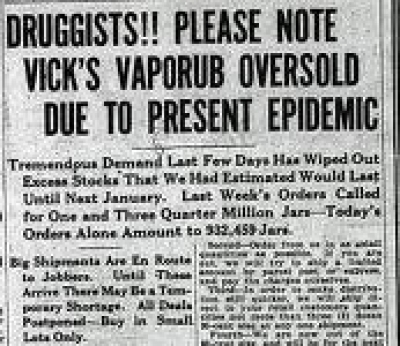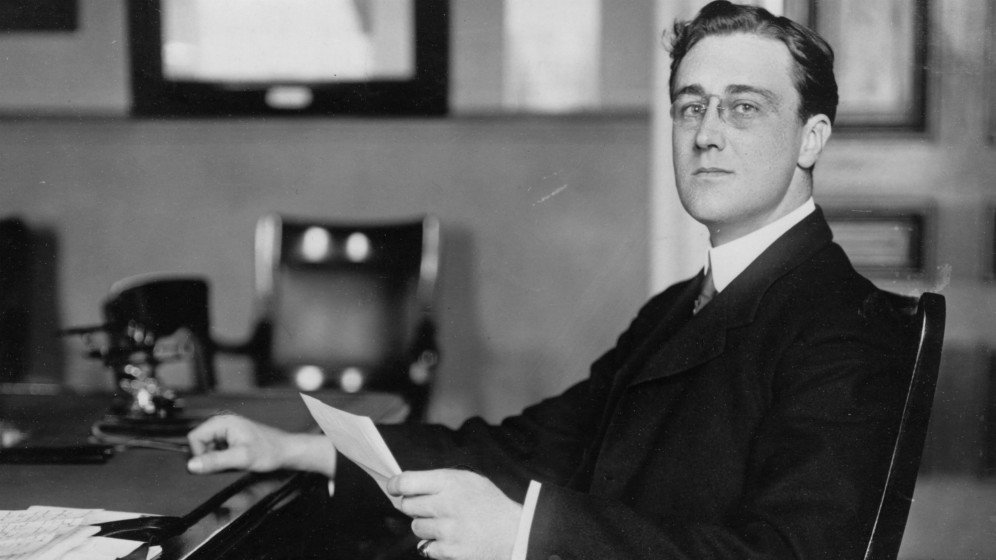
Crisis comes and goes at different times for different people. You have a sense that often tells you when it has arrived or departed. You can know it.
The arrival of crisis is known today in Cincinnati, Ohio. It’s Day 29, October 6, 1918, and the city shuts down. Just about everything closes until someone in a position of authority decides otherwise. People across Wisconsin seem to know crisis is here, too; they’re hoarding small bottles of Vicks VaPo Rub for prevention or treatment of influenza. Syracuse, New York is averaging one influenza-based death per hour today. The hourly average of deaths is ten-times that rate in Philadelphia right now. Fort Benjamin Harrison near Indianapolis, Indiana has removed new ten corpses from the base hospital during the night. This news hits the city like a lightning bolt and has caused local officials to meet suddenly for emergency discussions. Crisis knocks on the meeting room door.
At a local hospital in Indianapolis, a 33-year old nursing supervisor named Edna Fletcher gathers her thoughts and takes a deep breath. In her heart and mind and soul, the voice of crisis whispers. She hears the call.
Other voices speak this day in Virginia and Maryland. At Quantico, the doctors pronounce Brigadier General Charles Doyen dead. Known as an amazing leader, Doyen is the first Marine to have ever received command of an Army division. Doctors at Camp Meade, a few hours away, make a similar pronouncement about one of their own—Dr. George Mathers, Captain US Army Medical Corps, dies today. The irony kills almost as much as the illness: Mathers had just successfully identified the bacteria in the camp which was the cause of pneumonia.
The departure of crisis is on some minds. At an ornate home in Manhattan, downtown New York City, wealthy matriarch Sara Delano Roosevelt celebrates her only child’s recovery from influenza. He’s up and walking, active and robust. 35-year-old Franklin Delano Roosevelt has survived influenza and is ready to return to work as the Assistant Secretary of the Navy. Despite her son’s recovery, Mother Roosevelt’s mansion has a frosty air. Franklin and his wife Eleanor aren’t on speaking terms today. Several days ago Eleanor had discovered a box of letters exchanged between her husband and his mistress. Their family crisis continues as the national crisis continues.
Dr. Gordon Hirshbert is unaware of the problems in the Roosevelt marriage. He is fully aware, though, that Franklin Roosevelt is a shining example of good news, of a crisis possibly departing. Dr. Hirshbert publishes an article today in Richmond, Virgina and highlights Roosevelt’s recovery in his writing. He lifts up hope for his readers to see: “That this (influenza) is the only epidemic disease produced by the world war is a remarkable proof of the protection afforded to us by modern medicine and hygiene.”
Arrivals. Departures. Crisis coming and crisis going. Clear on the front end. Less clear on the back end.
A thought for you on Day 29, April 10, 2020, twenty-nine days after President Trump declares Covid-19 a national emergency—let’s stay with it, the edges of crisis. I do think it’s more evident when crisis is upon us rather than when it’s over. An event happens, something extraordinary. Data is part of knowing the beginning of crisis but it isn’t often the telltale sign. Instead, the start of crisis is usually a broader experience or environment that wraps around data, information, and the rest. It is acutely known, sensed, felt. The ending of crisis is the disappearance of the experience itself. A stage is reached that brings completeness, conclusion, and onset. It, the crisis, passes and a new moment and environment opens, maybe normalcy’s return or maybe not. For us, we’ll likely see that the departure of crisis has its own set of issues, problems, and challenges. It may be harder to know than we predict or expect. Dr. Hirshbert wanted ever so much for people to place the crisis behind them in early October 1918. But there are many, many times when crisis acquires a life and in its own mysterious way, must be lived in, lived through, lived out. For myself, I’m a praying person. Part of my prayer is to gain some glimpse of wisdom to know when the outline of crisis departing is on the horizon, to discern its approach. If it’s OK with you, I’ll add you to my private expression.

(note to reader—I invite you to subscribe to this series/blog. The purpose of my posting in this series is the purpose of my enterprise at Historical Solutions—to explore the past in a new way that brings new and different value to you, both in the present (this minute) and on the edge of the future (what’s ahead or forward of this minute). The past is everything before now, the totality of all time before the present; history is a set of very small slices of the past that, for a particular reason, have been remembered. If you wish to contact me privately, please do not hesitate to text or call 317-407-3687)







